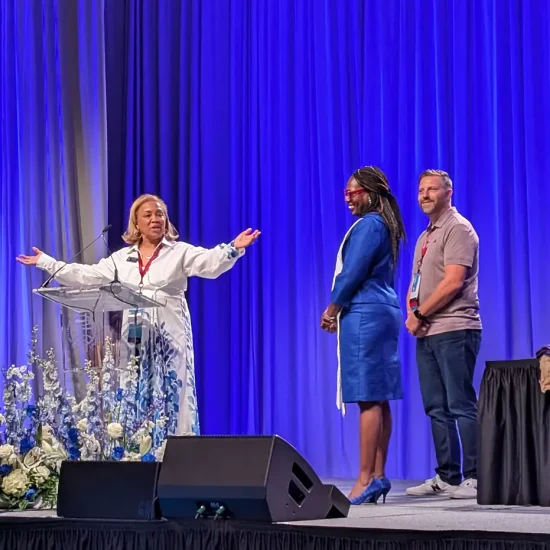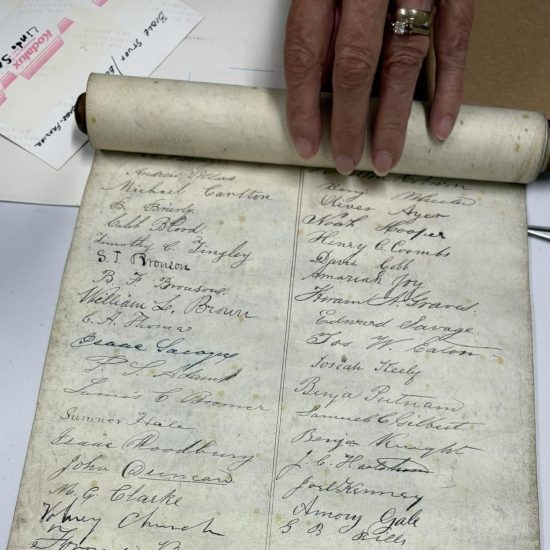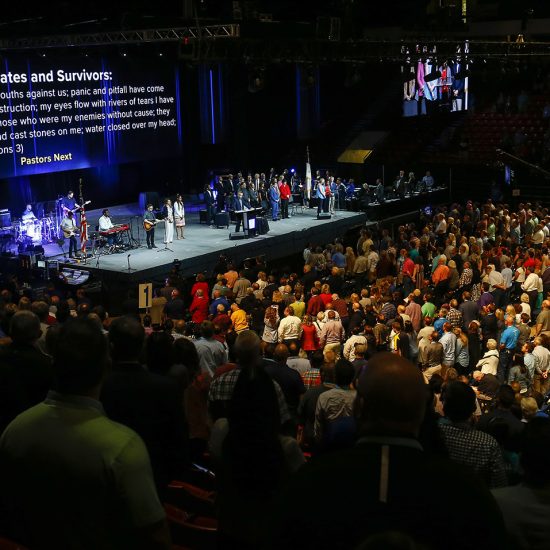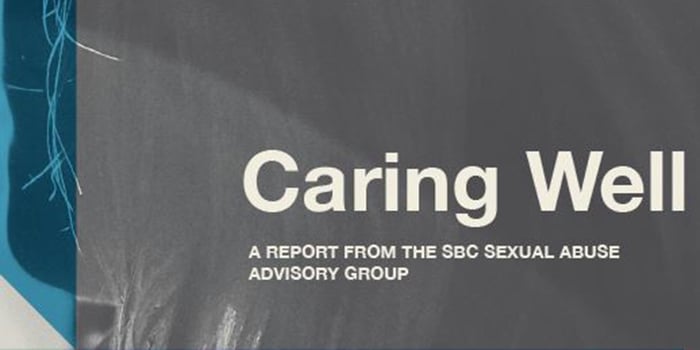
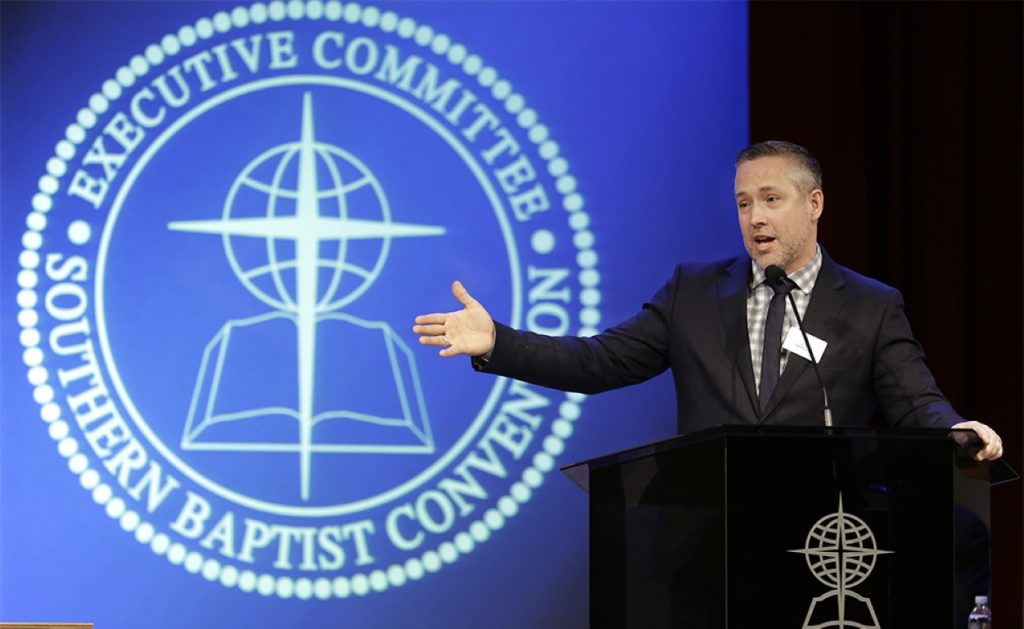
Southern Baptist Convention President J.D. Greear speaks to the denomination’s executive committee on Feb. 18, 2019, in Nashville, Tenn. Just days after a newspaper investigation revealed hundreds of sexual abuse cases by Southern Baptist ministers and lay leaders over the past two decades, Greear spoke about plans to address the problem. (AP Photo/Mark Humphrey)
(RNS) — A new Southern Baptist Convention report on sex abuse, filled with the voices of survivors, acknowledges numerous ways the denomination has failed to protect members of its churches.
The “Caring Well” report also summarizes a range of next steps to address the issue, including educating congregations about abuse, preparing them to help survivors and fostering abuse prevention.
“We lament the fact that it took a national movement of reckoning for abuse to force us to take this issue seriously in our own convention,” reads the 52-page report, which followed an investigation published May 31 in the Houston Chronicle detailing accusations involving dozens of Southern Baptists.
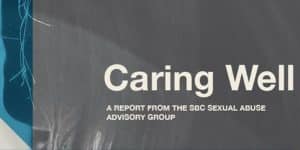 “It should now be obvious that the problem has been and still is more widespread than anyone has realized,” the SBC’ report said, “affecting our congregations all over the country, from the smallest church pastored by a bivocational minister to the megachurch with hundreds on staff.”
“It should now be obvious that the problem has been and still is more widespread than anyone has realized,” the SBC’ report said, “affecting our congregations all over the country, from the smallest church pastored by a bivocational minister to the megachurch with hundreds on staff.”
The issue has also affected seminaries, agencies and missions boards, the report said, adding, “all too often, it has not been handled justly.”
The report, to be presented during the Southern Baptists’ annual meeting next week, is the result of almost a year’s work by a Sexual Abuse Advisory Group commissioned by SBC President J.D. Greear. It is based on an inquiry involving “hundreds” of sex abuse survivors, church leaders and national experts.
While acknowledging the report is not intended to be either exhaustive or “fully prescriptive,” the Advisory Study says one of its aims “is to begin to illuminate the evil that has occurred within our midst by sharing the stories of survivors of sexual abuse.” The report expresses gratitude to the “brave men and women” who told their stories of abuse so the SBC could understand the scope of the “sexual abuse crisis” it faces.
The first clergy abuse survivor quoted in the report used the word “epidemic” to describe the extent of sexual abuse in the nation’s largest Protestant denomination.
“The cause of sexual abuse in the SBC is rooted in our culture of casual indifference to predatory sexual behavior,” says Susan Codone, who said she was abused by her youth minister and by her pastor who fired him and then continued the abuse.
“Worn like a shield, indifference results in the catch-and-release practice of catching predatory staff members in the act and releasing them to move freely among other churches and organizations and harm others,” Condone said.
While Condone chose to be identified, some of the other survivors had their names changed or were cited anonymously.
The report repeatedly refers to sexual abuse as “evil,” and calls the “meager efforts” outlined in the report only the beginning of what is hoped will be a “movement of healing and reform.”
The report said that the term “clergy abuse” does not apply solely to misconduct involving children.
“Clergy abuse not only encompasses abuse to children, but also a ‘consensual’ adult sexual relationship between a clergy member and a congregant,” it said. “The power and spiritual influence that a member of the clergy wields over their congregants essentially renders consent impossible.”
Codone said in the report that the pastor who abused her also had an inappropriate relationship with her Sunday School teacher.
Among the numerous failures named in the report were inadequately training staff and volunteers, declining to report suspected perpetrators to law enforcement and instead recommending them to new employers, and improperly citing church autonomy to avoid acting appropriately.
It noted that a new study by LifeWay Research about abuse in the church found that just half of Protestant churchgoers want victims to be protected when abuse is discovered. The report called that finding and others — including that just 63 percent of respondents wanted the truth about sexual abuse to be made public ” — a major cause for concern.”
Greear said the report “is a good first step at capturing where we have come from and where we must go to serve the vulnerable.”
“At its core, the Gospel is about God’s commitment to protect the vulnerable,” Greear said in written comments for Baptist Press. “The cross shows us that He is a safe refuge for all who run to Him. What greater lie could we tell about the Gospel than for us not to be doing whatever it takes to make our churches a safe place for the vulnerable?”
In three sections, the report calls for:
— The education of Southern Baptist churches to understand abuse, its prevalence, its effect, its underlying issues and the failures of churches.
The Advisory Study expresses lament in the report for every victim and cites statistics demonstrating how prevalent sexual abuse is in the church and the country — including a Department of Justice figure that one in four women and one in six men will be sexually abused before the age of 18.
The report says a misapplication of theology that is at the root of the abuse problem calls for correction in several areas, including a failure to value every person as an image bearer of God, a flawed handling of confession and forgiveness, and a misunderstanding of church autonomy.
Churches “must be willing to enter into the messy reality of abuse and not hide from the reality that is surrounding us,” according to the report.
— The equipping of Southern Baptist churches to care for abuse survivors.
Some churches and leaders “have been most concerned with protecting the reputation of their ministry and the church” when abuse is reported, the report says. As a result, they have failed to protect the vulnerable and prevent future victims, according to the report. “Jesus does not need us to protect his reputation,” it says. “The survivor must be our top priority.”
The report recommends churches establish a plan of response to a report of abuse that might include developing caregivers “to walk alongside” a survivor, know what the legal requirements are for disclosure, become acquainted with agencies that work with survivors and institute a policy for handling accused predators.
— The preparation of Southern Baptist churches to prevent abuse.
Churches must be proactive to keep abuse from occurring, according to the report. Steps to protect those in the church from predators, according to the report, are: Training staff and volunteers to recognize and prevent abuse; establishing safety policies; screening employees and volunteers and checking references; and developing a team of caregivers to assist survivors who disclose abuse.
It also recommends a new free video series called “Becoming a Church that Cares Well,” which features experts sharing best practices concerning a range of scenarios in a church, ministry, or school.
The report concludes by asking Southern Baptist churches to take an eight-step “Caring Well Challenge” over the next year to help them “be safe for survivors and safe from abuse.”
The document follows other actions by Greear and fellow SBC executives since the last SBC meeting.
In February, Greear said the SBC Executive Committee should investigate 10 churches named in a report by Texas newspapers that found 380 current and former Southern Baptist ministers and volunteers had been accused of sexually abusing more than 700 victims in the past 20 years.
An Executive Committee workgroup responded less than two weeks later by saying just three out of the 10 merited investigation.
More recently, SBC leaders have considered setting up an official “Credentials Committee” that would review complaints about how member churches handle abuse allegations. If it is approved by the Executive Committee, Baptists would vote on the proposal during their June 11-12 meeting in Birmingham, Ala.
This article includes reporting by Tom Strode of Baptist Press.

